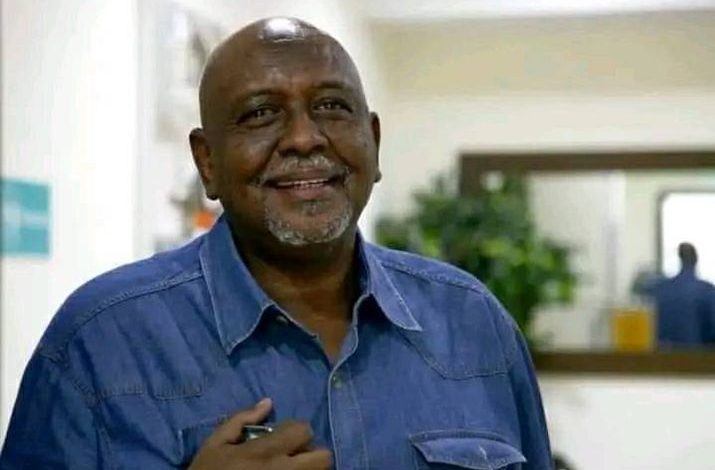Head of the Dramatists Syndicate, Al-Rashid Ahmed Issa: Dramatists did not run away and tell war stories in their works

Sudan Events – Follow-ups
(If someone had told me this story, I would not have believed it.
But how can I lie to my eyes full of tears?
My hands are stained with blood…
Oh sea…oh island…
Am I a criminal or a victim?
Am I a criminal or a victim?)
The poet Samih Al-Qasim..
(I see people passing by on the road
Some of what’s left of me sees people
They probably haven’t lost someone they loved
Or did they lose it and still continue on their way?
I don’t know how our legs never stop walking
When we lose someone we love!
Did not we walk on our own two feet but on his feet
Wasn’t the whole outing for him?
Wasn’t it the picnic?
How does one walk if one loses someone?
He was walking and I was following him
I was walking in it
And when I stopped… I no longer had legs)
Poet
Wadih Saadeh..
War is not a picnic..
War is an absolute evil
The war is against beauty, against survival.. against man.. against the artist.. the bearer of questions of existence and identity who is concerned with achieving the values of goodness, truth, and justice.. the artist is the conscience of his society, its values, and its morals..
Therefore, we are against war because it is nothingness, because it is the annihilation of all the beauty that we seek..
The drama artist has been in our homeland for more than a hundred years, working to realize the dream of the Sudanese person in building his homeland.
It started with an educational and awareness-raising theater by Babikir Badri, then the play “Naktot” by the mayor of Al-Qatina, then a resistance theater by Obaid Abdel Nour…a unique friend…Ali Abdel Latif…
Then the stage of building our social fabric… Al-Abadi, Al-Mak Nimr… and the early call for national unity
What is the benefit to me?
Other than for reasons of disagreement, I thought my brother was against me..
Let our prophet reach far and near..
The Nile is enough, our father is Sudanese..
And then the father of Sudanese theatre, Khaled Abu Al-Ra’us…and a great generation of fathers, Maysara Al-Sarraj…the honorable Saeed…
Ahmed Osman Issa..
Mahmoud Siraj Abu Qabura
Sarah Mohamed Ismail Khorshid..Mohamed Khalafallah..Tur al-Jar..Osman Ahmed Hamad..Makki Sinada..Youssuf Eidabi..Hashim Siddiq..Al-Rih Abdul Qadir..Yahya Haj Ibrahim..Izz al-Din Hilali..Abu al-Abbas Mohamed Taher ..Nafisa Mohamed Mahmoud..
Osman Jamal al-Din.. Saad Yousuf.. Mohamed Khojali Mustafa.. Mohamed Reda Hussein..
Speech by Hassan Ahmed.. Abdulaziz Al-Amiri..
Fathia Mohamed Ahmed.. Balqis Awad.. Rabha Ahmed Mahmoud.. Mohamed Sharif Ali.. Hassabo Mohamed .. Abdullah.. Ibrahim Hegazy.. Youssuf Khalil.. Othman Ali Al-Faki. Salah Al-Din Al-Fadil… Mona Abdel-Rahim… Somaya Abdel-Latif… Tahia Zarouq… These are some of our pyramids that were landmarks of our great theater…
From these people we came out to carry the shovels of change and construction.
We had great fathers who made worthy sacrifices for this country and never tired of their love for their home theater… for their audience and for their people who loved them and were loved by them…
The theater artist’s giving did not stop… even though the state was not up to the level of loyalty…
Then the Higher Institute of Music and Theater was the citadel of knowledge that achieved continuity on the desired path.
To present a group of creative people
They spread that culture over a million miles. They carried the longings and aspirations of the homeland in their visions and carried on with the dream until we reached what we have reached in terms of endings that the artist saw and anticipated.
He warns against it.. Our role is to point out the defects and dangers.. To recognize evil before it happens.. To make beauty our approach to change..
Despite the war, killing, destruction, displacement and homelessness
Rape, oppression, disease, and hunger… the drama artist was with his people and his family… displaced and oppressed… hungry, sick and exhausted… but he did not stop playing his role.
In all the cities of displacement, they presented theater that dealt with war issues. They worked to rehabilitate people in shelter centers.
They presented purposeful theatre, theater for children.
They told war stories of rape and murder. They were with the people. They expressed their feelings.
They were honest.
They were with their people and did not flee to the capitals of the world
Leaving their families to suffer from these woes.
We are dramatists
We work to reshape the human experience and the relation between him and his reality by providing a new awareness of this relation through an aesthetic work that explains this relationship.
Our position on the war will remain an existential position
Because war is nothingness.
Because war is against peace
Because art is peace..
As our master Khurshid said
Whenever I open a theater, I am happy, and whenever I open a theater, I am happy.



